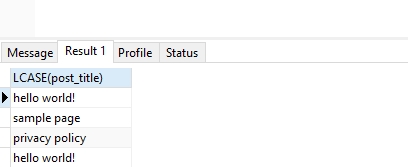MySQL is an open-source relational database management system. It is often used with PHP to make websites.
Are you among those folks who are eager to learn MySQL yet do have not enough time to do it because of a busy schedule? We highly suggest that you must try availing of paid tutorials and courses about MySQL. One good reason to do so is that you can have the course at any time of the day- meaning in your free time! Rest assured that you will be able to learn MySQL in just one sitting.
Table of Contents
MySQL Tutorials and Courses
- The Ultimate MySQL Bootcamp: Go from SQL Beginner to Expert – This course is a gentle but comprehensive introduction to MySQL. In this course, you will learn the ins and outs of SQL syntax, generate reports using sales and user data, analyze data using Aggregate Functions, run complex queries using MySQL logical operators and string functions, write all the common SQL joins, work with large datasets containing thousands of entries, and more advanced MySQL skills.
- MySQL Tutorial – This list consists of basic MySQL tutorials and how to combine them with PHP. You can find a large number of database management systems in today’s marketplace: some commercial ones that are expensive, but worth it; others free options like MySQL which offer many benefits at no cost!
- Crash Course on MySQL – This quick tutorial covers common tasks associated with looking after a single MySQL server. It will introduce installing and securing the server, useful debugging techniques, common SQL statements, user access, and permissions, and finally backup and restore options.
MySQL Tools & Clients
- Navicat – Navicat for MySQL is the ideal solution for MySQL administration and development. It is a single application that allows you to connect to MySQL and manage on localhost or remotely on Windows, macOS, and Linux.
- Adminer – A simple tool to manage MySQL databases online.
- phpMyAdmin – It handles the administration of MySQL over the Web.
What is MySQL?
MySQL is a database management system. It is a cross-platform, multi-threaded SQL database that provides high performance for the server and client applications.
MySQL can be used as an embedded database in many software products such as OpenOffice or Adobe InDesign – these options make it easy to take your data with you when switching providers!
There are also MySQL clones like MariaDB which provide similar features at no cost. You’ll never need to worry about running into any licensing issues because all of those have been eliminated by this open-source version of MySQL.
You should definitely consider using a platform based on MySQL if you’re looking for a solution to manage large amounts of data efficiently without compromising quality and security.
Advantages of MySQL
MySQL is a database management system or DBMS. It can be used to manage either real-time or offline data. As an RDBMS (relational database), MySQL provides high availability and durability of its services. In this way, it benefits both developers who use the tools to develop web applications as well as end users on the web pages those applications generate for them (source).
In addition to these features that benefit all parties involved in storing and using the information/data provided by MySQL databases, there are also other aspects of MySQL that help companies cut costs: fewer software licenses needed, lower hardware maintenance needs, more efficient use of resources without compromising any aspect of performance.
One benefit that makes MySQL powerful is its ability to scale, meaning it can grow with your data without slowing down as you add more content.
Another major benefit of using MySQL is the wide variety of open-source tools available. You don’t need any special software licenses or permissions from anyone else before accessing these free resources! There’s no comparison – there’s nothing stopping hackers when they target one vulnerability.
Another thing to consider is MySQL’s support team. When you have any issues with your database, their highly qualified staff can assist and solve the problem in a matter of minutes – hours at worst.
Lastly, if you move from one host to another, or even switch databases entirely, there are no worries about portability because all data will be transferred automatically without requiring any input by the user! This means that it’ll never be lost when switching providers (as long as they use MySQL too).




